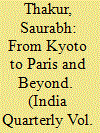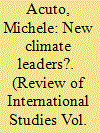|
|
|
Sort Order |
|
|
|
Items / Page
|
|
|
|
|
|
|
| Srl | Item |
| 1 |
ID:
183507


|
|
|
|
|
| Summary/Abstract |
Australian IR scholars and scholarship have been prominent in framing, informing and contributing to global debates in the field of global environmental politics. This article reviews and analyses those contributions with a focus on the period since 2009. It takes as a starting point research that addresses international or global environmental issues, including those that demand a scalar approach to how the global is voiced and experienced at local and regional sites, and that, in doing so, illuminates key disciplinary concerns and contributes to disciplinary debates. The core of the article is woven around three overlapping sub-fields: global environmental governance, international political economy, and normative IR. It reveals how Australian-based IR scholars working on the environment have engaged with critiques of neo-liberalism, pursued more critical approaches to securitization, expanded the empirical and conceptual basis of how we understand institutional ecosystems, contributed to bringing social justice concerns to the forefront of global environmental politics and theory, and been part of a conversation about environmental challenges in the Asia Pacific region. The article concludes with some thoughts about the future direction of this research and scholarship.
|
|
|
|
|
|
|
|
|
|
|
|
|
|
|
|
| 2 |
ID:
180238


|
|
|
|
|
| Summary/Abstract |
Anthropogenic climate change has emerged as the most disruptive socio-political issue in the last few decades. The Kyoto Protocol’s failure to curb the rising greenhouse gases emissions pushed the UNFCCC-led negotiations towards a more flexible, non-binding agreement at the Paris COP21 meeting in 2015. The Paris Agreement’s hybrid approach to climate change governance, where flexible measures like the nationally determined commitments are balanced against the ambition of limiting the global temperature within the two-degree range, ensured the emergence of an increasingly complex and multi-stakeholder climate change regime. The article outlines the roadmap of the transition from the top-down approach of Kyoto Protocol to the legally non-binding, bottom-up approaches adopted for the post-Paris phase. The article outlines the post-Paris developments in international climate politics, which hold long-term geopolitical and geoeconomic implications. The article focuses on the fundamental shifts and balances within the UNFCCC architecture and examines the four fundamental features of this transition—the interpretation of differentiation and common but differentiated responsibilities, the evolving role of emerging economies in the negotiations, the rising profile of non-party stakeholders in shaping the climate action strategies and the emergence of climate justice movements as an alternate site of climate action.
|
|
|
|
|
|
|
|
|
|
|
|
|
|
|
|
| 3 |
ID:
123351


|
|
|
|
|
| Publication |
2013.
|
| Summary/Abstract |
Little interest has thus far been paid to the role of cities in world politics. Yet, several are the examples of city-based engagements suggesting an emerging urban presence in international relations. The Climate Leadership Group, despite its recent lineage, is perhaps the most significant case of metropolitan intersection with global governance. To illustrate this I rely on Actor-Network Theory (ANT) to develop a qualitative network analysis of the evolution of the C40 in the past seven years from a limited gathering of municipal leaders to a transnational organisation partnering with the World Bank. Pinpointed on the unfolding of a twin diplomacy/planning approach, the evolution of the C40 can demonstrate the key role of global cities as actors in global environmental politics. These cities have a pivotal part in charting new geographies of climate governance, prompting the rise of subpolitical policymaking arrangements pinpointed on innovative and hybrid connections. Yet, there remains some important rational continuity, in particular with neoliberalism, which ultimately limits the revolutionary potential these cities might have for international relations.
|
|
|
|
|
|
|
|
|
|
|
|
|
|
|
|
| 4 |
ID:
153814


|
|
|
|
|
| Summary/Abstract |
Despite the increasing urgency of many environmental problems, environmental politics remains at the margins of the discipline. Using data from the Teaching, Research, and International Policy (TRIP) project, this article identifies a puzzle: the majority of international relations (IR) scholars find climate change among the top three most important policy issues today, yet fewer than 4% identify the environment as their primary area of research. Moreover, environmental research is rarely published in top IR journals, although there has been a recent surge in work focused on climate change. The authors argue that greater attention to environmental issues—including those beyond climate change—in IR can bring significant benefits to the discipline, and they discuss three lines of research to correct this imbalance.
|
|
|
|
|
|
|
|
|
|
|
|
|
|
|
|
| 5 |
ID:
118949


|
|
|
|
|
| Publication |
2013.
|
| Summary/Abstract |
In this article, we consider how states wield shaming strategies to 'be green' and to try to influence other states to 'become green' - environmentally responsible states. We compare Australia-Japan relations in the international politics of whales and tuna, respectively, and show that only at the level of norms and identities, rather than material interests, can two seemingly contradictory behaviors be reconciled, where a country shames another in one case (whales) and deliberately spares it from shaming in another (tuna). We argue that each issue reveals two different ways in which Australia seeks to construct itself as an environmentally responsible state, following a 'preservationist' and a 'conservationist' paradigm, respectively. We thus contribute to the constructivist understanding of the role of norms of global environmental politics and of the links between norms, identities, and the choice of shaming as an instrument of foreign policy.
|
|
|
|
|
|
|
|
|
|
|
|
|
|
|
|
|
|
|
|
|